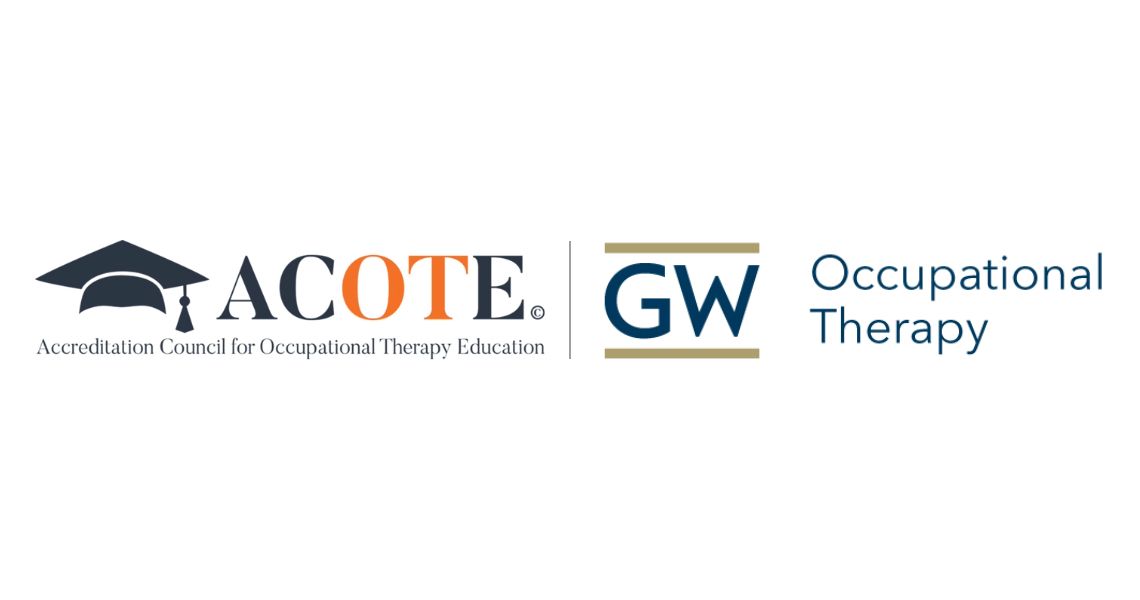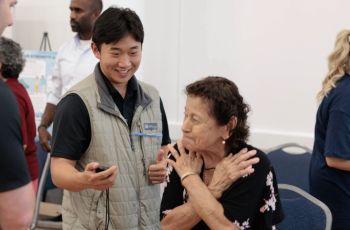The George Washington University School of Medicine and Health Sciences (SMHS) Doctor of Occupational Therapy (OTD) program has received a full, seven-year accreditation from the Accreditation Council for Occupational Therapy Education on December 13, 2024.
The comprehensive, three-step initial accreditation process began in 2018 and included a Candidacy Application, a Report of Self-Study, and an intensive three-day on-site evaluation involving approximately 60 faculty, staff, and students from October 7–9, 2024.
“I am proud of this accomplishment because we are striving to provide a different OT education than what is seen nationally. Our educational framework is grounded in interdisciplinary collaboration, community engagement, and values of justice, equity, and diversity. Through this program, we have seen that students are embracing this framework and embodying these values to become changemakers in society as effective practitioners and advocates for marginalized communities,” said Roger Ideishi, JD, OT/L, FAOTA, program director and professor of the occupational therapy program.
“This is a wonderful accomplishment and a testament to the program’s hard work, dedication, and innovative curriculum,” said Ellen Costello, PT, PhD, the department chair of Health, Human Function & Rehabilitation Sciences.
Joyce Maring, EdD, DPT, the executive associate dean of Health Sciences, had the vision and foresight to champion the OT program and its development, stated that “it has been a long time coming. This outcome reflects the excellence and hard work of the program.”
The Report of the Accreditation Council (RAC) stated the following strengths, suggestions, and areas on noncompliance that contributed to the program’s accredited-status:
Major Strengths
The five strengths identified in the review of the materials submitted by the program and the findings of the on-site team reflect high levels of faculty involvement, community engagement, and leadership and advocacy themes within the curriculum.
- The program director (Roger Ideishi, JD, OT/L, FAOTA) is to be commended for his high-level, comprehensive view of the profession and a detailed, organized roadmap for program development. His leadership in building curricular themes and fostering a strong sense of community among faculty, staff, and students has not only fostered a sense of belonging and teamwork but also resulted in students and faculty becoming analytic, reflective, and systems-level thinkers aware of global health inequities.
- The program director and faculty are recognized for their collaboration with students. When students have questions or uncertainties, faculty members guide them in using critical thinking strategies rather than just giving answers. Students say this approach helps them build skills and confidence in their ability to learn. Consequently, fieldwork educators report that these students quickly take initiative and independently seek resources to solve problems.
- The fieldwork coordinator (Danielle Centi, DrOT, OTR/L, CBIS) is recognized for expanding the number of level II fieldwork sites that focus on underserved populations. This expansion will provide students with opportunities to incorporate the curriculum’s emphasis on justice, equity and inclusion in a practice setting. As a result, students will be better prepared to address health inequities and provide services to underserved populations.
- The doctoral capstone coordinator (Sheila Moyle, OTD, MOT, OTR/L) is exceptional in facilitating collaboration between students, faculty, and site mentors to identify capstone projects that embrace students’ interests, faculty’s research, and sites’ needs. This collaboration results in clear connections between the program mission and doctoral capstone projects.
- The occupational therapy students are commended for their ability to articulate the links between the didactic content, occupational therapy curricular critical thinking themes, and their practice experiences. This integration of thinking and knowledge will result in practitioners ready to lead change in healthcare systems.
Suggestions
- No suggestions were provided to enhance the program based on the review of the materials submitted by the program and the findings of the on-site team.
Areas of Noncompliance
- All Standards were found to be compliant based on the review of the materials submitted by the program and the findings of the on-site team.
The inaugural graduating class of the GW occupational therapy program will be eligible to take the NBCOT certification examination in 2025. The next on-site evaluation will be scheduled within the academic year 2031/2032.
View the school directory for ACOTE-accredited schools, here:
School Directory



